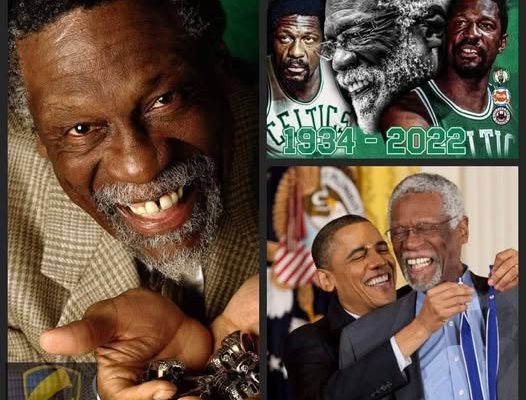William Felton Russell, known to the world simply as Bill Russell, remains a towering figure not just in the history of basketball, but in the broader realm of American sports and civil rights. On this day, as Golden Oldies pauses to reflect on his passing, the magnitude of his influence both on and off the court resounds louder than ever. Born on February 12, 1934, in Monroe, Louisiana, and passing away on July 31, 2022, Russell’s journey from the racially segregated South to the pinnacle of NBA greatness and social advocacy is the embodiment of resilience, excellence, and dignity.
Russell’s career with the Boston Celtics from 1956 to 1969 is the stuff of legends. As a center, he defined defense and revolutionized the role of a big man in the NBA. With his remarkable shot-blocking skills, rebounding dominance, and uncanny basketball IQ, Russell was the cornerstone of a Celtics dynasty that captured 11 NBA championships in 13 seasons—a feat unmatched in the history of professional basketball. His competitive fire and commitment to winning made him a five-time NBA Most Valuable Player and a 12-time NBA All-Star. But to boil his greatness down to statistics and trophies would be a grave understatement.
Before his NBA stardom, Russell led the University of San Francisco (USF) Dons to back-to-back NCAA championships in 1955 and 1956, bringing national attention to a program that had never before seen such success. He also helped the U.S. national basketball team capture a gold medal at the 1956 Summer Olympics in Melbourne, Australia, where his leadership and athleticism were on full display. These accomplishments laid the groundwork for his future dominance in the NBA and demonstrated his ability to elevate every team he played for.
What set Russell apart from his peers was not just his defensive prowess or his championship pedigree, but his unwavering commitment to civil rights and social justice. At a time when it was neither popular nor easy for Black athletes to speak out, Russell did so unapologetically. He marched with Dr. Martin Luther King Jr., spoke out against racism in sports and society, and stood with fellow athletes like Muhammad Ali when Ali refused induction into the U.S. military during the Vietnam War. Russell did not separate his identity as an athlete from his identity as a Black man in America, and he bore the burdens that came with that choice with courage and grace.
In Boston, a city with a complicated racial history, Russell’s relationship with fans and the community was at times strained. He endured racist taunts, vandalism of his home, and a lack of appreciation for his on-court accomplishments. Yet he never allowed the ignorance and hatred of others to derail his mission. Instead, he focused on winning and on using his platform to shine a light on injustice. He became the first Black head coach in NBA history when he was named player-coach of the Celtics in 1966, breaking barriers not only on the court but on the sidelines as well.
Russell’s leadership extended far beyond basketball strategy. He inspired teammates by setting the highest standards and holding everyone accountable—including himself. He believed in the power of unity, sacrifice, and playing for something greater than individual accolades. That ethos made the Celtics one of the most formidable and selfless teams in sports history. His partnership with teammates like Bob Cousy, John Havlicek, Sam Jones, and coach Red Auerbach was instrumental in building a culture of excellence that influenced generations to come.
After retiring from the game in 1969, Russell remained a visible and vocal advocate for equality. He wrote books, gave speeches, and mentored younger athletes who sought to balance greatness in sport with a commitment to justice. His legacy took on new meaning in the wake of movements such as Black Lives Matter, where younger NBA players began to echo the same values Russell championed decades earlier. For these athletes, Russell became a blueprint—someone who proved that one could stand for something larger than the game and still be the best at it.
In recognition of his immense contributions, Russell was awarded the Presidential Medal of Freedom in 2011 by President Barack Obama. During the ceremony, Obama praised Russell not only for his dominance on the court but for his courage off it, noting that he “stood up for the rights and dignity of all men.” That medal was a fitting tribute for a man who spent his life fighting battles that extended far beyond basketball arenas.
Russell’s influence was also felt in the way the NBA evolved culturally. As the league grew more inclusive and socially aware, many of its foundational values could be traced back to Russell’s example. His insistence on dignity, integrity, and justice became hallmarks of the league’s modern identity. When the NBA faced reckonings over issues of race and inequality, the players often cited Russell as their guiding light. The league’s decision to name the NBA Finals MVP trophy in his honor is a testament to his enduring impact.
Despite his accolades and fame, Russell remained remarkably humble. He was known for his dry wit, philosophical reflections, and a disarming laugh that belied the intensity of his competitive nature. He once famously said that he played for the love of the game and the pursuit of excellence—not for individual praise. That humility was part of what made him so beloved in the latter stages of his life. As tributes poured in from athletes, politicians, and fans around the world upon his death, one common theme emerged: Bill Russell was not just a champion, he was a man of principle.
Russell’s death on July 31, 2022, marked the end of an era, but his legacy remains firmly intact. His story is woven into the fabric of American history—not just sports history—and his impact will be felt for generations to come. From the hardwood of Boston Garden to the front lines of the civil rights movement, Russell walked a path few dared to tread and left footprints that will never be erased.
In remembering Bill Russell, we honor not just the 11 rings, the MVP awards, or the Olympic gold medal. We remember the man who stood tall—literally and figuratively—in the face of adversity. We celebrate the trailblazer who refused to be silent. We cherish the leader who taught us that greatness is measured not only by what you achieve, but by what you stand for.
Rest in power, Bill Russell. The game will never forget you. The world will forever respect you.



